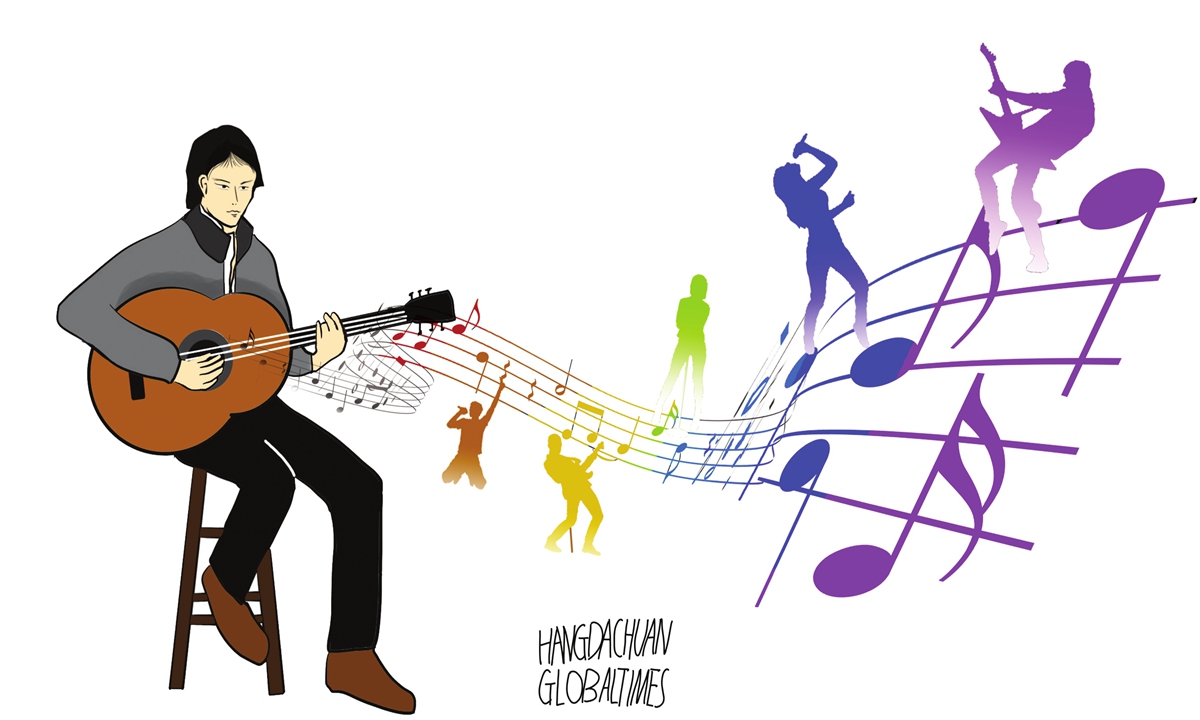ARTS / MUSIC
'Elvis of China' embodies same roots of cross-Straits cultural ties

Illustration: Hang Dachuan/Global Times
The news and correction of the news of the "death" of Taiwan singer Liu Wen-cheng, also known as Steven Liu, sparked many memories for his music, which was extremely popular during the 1970s and 1980s in the Chinese mainland and raised the curtain for cross-Straits cultural exchanges.
Liu's name may be new or even unknown to young pop music fans today, but he truly was a superstar 40 years ago across the Taiwan Straits. Dubbed the "Elvis Presley of China," Liu was known as a creative singer as he held the first singing concert on Taiwan island and made the first music video in Chinese musical circles.
Songs such as "Light Rain in March" and "Grandma's Penghu Bay" became famous through his singing, influencing a generation of people on the mainland at that time. He was a youthful memory for young people in the 1980s with boys taking him as their idol and girls eager to "marry him."
Liu was only one of a number of Taiwan singers at his time who were loved by mainland people.
In the 1980s, the cross-Straits relations made a historical breakthrough, and cultural exchanges started thanks to the policy of the "Three Links" - transportation, mail as well as commerce.
It was during this period when songs by Liu and other Taiwan singers were introduced to the mainland and became popular everywhere, which surely helped promote understanding and exchanges across the Straits.
Another reason for his songs' popularity was that the mainland and Taiwan share the same cultural roots, the same language, and the same traditions. So their songs reflecting people's sentiments, interests and values could easily be understood by and strike a chord among the people of the mainland.
Cross-Straits cultural exchanges used to be a one-way street as Taiwan's pop music took a dominant position during Liu's heyday, but the reverse of the situation shows a fuller picture of relations.
After the Chinese mainland's reform and opening-up in 1978, a small number of pop music songs from Hong Kong and Taiwan began to enter the mainland market.
In 1979, the songs of Liu were introduced to the mainland thanks to the availability of tape recorders.
In the 1980s, "campus folk songs," a genre of pop music created in Taiwan, became popular in the mainland, bringing in a youthful and romantic style of pop music.
From then on, some mainland musicians started to sing and write their own songs by following the style of Liu and other Taiwan singers.
In 1986, the first mainland pop song style was solidified during the Young Singers Competition organized by the mainland's China Central Television station. The singing of some original pop songs by mainland musicians signified the rise of the region's pop music.
In the mid-1990s, Guangzhou and Beijing became the two centers of mainland pop music, and the three styles from Hong Kong, Taiwan and the mainland interacted and contended, ushering in a "golden era" of Chinese pop music.
In recent years, some Taiwan singers have come to the mainland and settled here to advance their careers. In late 2023, the music variety show Circle of Life Taiwan Edition will air on online video platforms in the mainland.
The shows contestants will be made up of half Taiwan singers and half from the mainland.
Many pop fans are looking forward to this program and the familiar songs by their favorite Taiwan singers. Once it airs, it will surely help promote cultural exchanges across the Taiwan Straits, just like Liu's songs did about 40 years ago.
Liu and other musicians' popularity across the Straits decades ago when there was very few technical means of communication shows the strong resonance between the two sides, therefore, despite the obstruction of cross-Straits exchanges by the current DPP authorities in Taiwan, the cultural bonds between the two sides will only become closer.

